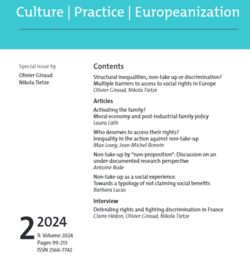
Culture, Practice & Europeanization -Special issue on barriers to access to social rights
Edition: Special issue, volume 9
ISBN: 2566-7742
Veröffentlicht am: 01.11.2024
Weiteres:
In the tradition of West-European welfare states, social policies are directed at protecting individuals against social risks such as unemployment, illness, or old age. In doing so, welfare state arrangements have an important effect on compensating for socio-economic inequalities, while simultaneously producing structural stratification (Esping-Andersen, 1998). The inequalities addressed by the welfare state are, however, always multidimensional. For instance, gender has for long been identified as a source of inequalities. Labour market regulations and social security systems have reinforced the male breadwinner model in most European countries (Lewis, 1992; Verloo, 2006), which has led to a higher degree of inequality between men and women. Welfare states may focus on one specific type of inequality, such as amongst socioeconomic groups (defined by professions, regions, income groups, etc.). The established welfare regimes ignore, however, other structures of inequality such as gender. Most of the time, they also overlook obstacles that can be traced back to specific vulnerabilities, such as migrants’ problem with residence permits or discrimination against people with disabilities, that eventually generate non-take-up of social benefits.
The present issue of Culture, Practice and Europeanization focusses on the barriers that socio-economic inequalities, non-take up, and discrimination constitute for access to social rights and benefits, centring attention on the process of making social policy and receiving social benefits in different national and welfare-state contexts. We aim to identify the elements and configurations that create and uphold these barriers as social policy is framed, implemented, and adopted by beneficiaries (Béland, Campbell & Weaver, 2022; Rein & Schön, 1996; Streeck & Thelen, 2005).

